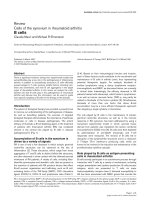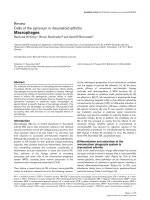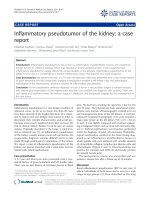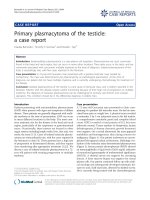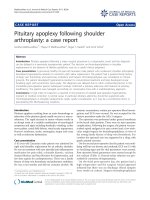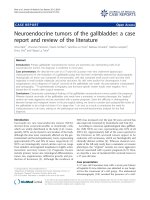Báo cáo y học: " Malignant melanoma of the rectum: a case report" ppsx
Bạn đang xem bản rút gọn của tài liệu. Xem và tải ngay bản đầy đủ của tài liệu tại đây (298.96 KB, 3 trang )
BioMed Central
Page 1 of 3
(page number not for citation purposes)
Journal of Medical Case Reports
Open Access
Case report
Malignant melanoma of the rectum: a case report
Sarah Liptrot*, David Semeraro, Adam Ferguson and Nicholas Hurst
Address: Department of General Surgery, Derby Hospitals NHS Trust, Derby, UK
Email: Sarah Liptrot* - ; David Semeraro - ;
Adam Ferguson - ; Nicholas Hurst -
* Corresponding author
Abstract
Introduction: Anorectal melanoma represents an unusual but important presentation of rectal
malignancy. There have only been a few cases reported and the optimum management for this
condition is still undecided, however, prompt diagnosis is essential. We have outlined current
treatment options.
Case presentation: We report a case of malignant melanoma of the rectum in a 55-year-old
Caucasian man presenting as an emergency with rectal bleeding. Biopsies were taken of the fleshy
mass found on digital examination, which confirmed malignant melanoma. No distant metastases
were found. He underwent an abdominoperineal resection. We report the surgical management
of this rare and aggressive malignancy.
Conclusion: Treatment options for this condition are divergent. Surgical management varies from
wide local excision to abdominoperineal resection. Clinical awareness in both medical and surgical
clinics is required for prompt diagnosis and treatment.
Introduction
In this patient, an emergency presentation of rectal bleed-
ing led to an unusual diagnosis. Rectal bleeding is a com-
mon presentation of rectal malignancy. An uncommon
form of this is malignant melanoma, attributing to only
1% of all rectal malignancies. Due to the aggressive nature
of this disease, an early diagnosis and prompt treatment
are essential.
Case presentation
A 55-year-old Caucasian man, previously fit and well, pre-
sented to the accident and emergency department follow-
ing a massive rectal bleed. On admission, he was
haemodynamically stable with haemoglobin at 15 g/dl.
His abdomen was soft and non-tender and percussion
note and bowel sounds were normal. Rectal examination
revealed an anterior fleshy mass at 11-12 o'clock situated
4 cm from the anal verge and just above the anorectal
angle.
When questioned, the patient said he had been bleeding
intermittently for 4 months but without any pain or
change in bowel habit. He was a non-smoker with an
unremarkable medical history.
Rigid sigmoidoscopy demonstrated a polypoid pig-
mented lesion at the anorectal angle. Biopsy demon-
strated malignant cells with pleomorphic nuclei and
abundant melanin in the cytoplasm. Completion colon-
oscopy was otherwise unremarkable. Computed tomogra-
phy of the thorax, abdomen and pelvis and magnetic
resonance imaging of the pelvis showed well-preserved
Published: 4 December 2009
Journal of Medical Case Reports 2009, 3:9318 doi:10.1186/1752-1947-3-9318
Received: 1 September 2008
Accepted: 4 December 2009
This article is available from: />© 2009 Liptrot et al; licensee BioMed Central Ltd.
This is an Open Access article distributed under the terms of the Creative Commons Attribution License ( />),
which permits unrestricted use, distribution, and reproduction in any medium, provided the original work is properly cited.
Journal of Medical Case Reports 2009, 3:9318 />Page 2 of 3
(page number not for citation purposes)
anorectal fat planes and no evidence of metastasis. Der-
matological and ophthalmological examinations revealed
no evidence of a cutaneous or an ocular primary lesion.
His case was discussed at the melanoma and colorectal
multi-disciplinary team meetings.
Shortly after his diagnosis, the patient underwent an
abdominoperineal resection (APR) without neoadjuvant
treatment. He made an uncomplicated recovery and was
discharged 13 days later. Immunohistochemical confir-
mation was obtained with cellular positivity for S100 and
melan-A antigens. The malignant melanoma was com-
pletely excised with clear margins of at least 2 mm. A mac-
roscopic image of the specimen is shown in Figure 1. At
surgery, five out of seven lymph nodes were involved. He
is currently being followed up by the oncology team and
will be considered for chemotherapy following repeat
imaging.
Discussion
Primary anorectal melanoma is a rare disorder accounting
for 1% of anorectal malignancies [1]. It is the third most
common site for melanoma after the eyes and skin. It typ-
ically affects women in the fifth or sixth decade and usu-
ally presents with rectal bleeding or a change in bowel
habit [2,3]. Unlike other forms, there is no association
with exposure to ultraviolet light.
Lesions are most commonly found at the anorectum, fol-
lowed by the anal canal and anal verge [4]. These lesions
are often discounted as being benign haemorrhoids or
polyps. Macroscopically, the tumours are polypoidal and
pigmented while microscopically, the cells are arranged in
nests with characteristic immunostaining specific for
melanosome protein [5,6].
Diagnosis is often delayed and a poor prognosis is com-
pounded by the aggressive nature of the malignancy
resulting in a median survival of 24 months and 5-year
survival in only 15% of cases. As a consequence, few sur-
gical guidelines are available. Radical abdominoperineal
resection may cure patients with <2 mm-wide lesions -
based on the hypothesis that the disease spreads proxi-
mally via the submucosa to the mesenteric lymph nodes,
it has been deemed the treatment of choice [7]. Wide local
excision (WLE) has also been described as a more conserv-
ative option. Radiation is palliative in extensive tumours
while combined chemotherapy is used to palliate meta-
static disease. APR appears to have some effect in control-
ling symptoms caused by local and regional disease but
has minimal impact on prognosis [8]. Prompt diagnosis
and treatment are crucial to improve outcomes for those
affected by this rare cancer.
Conclusion
Malignant melanoma of the anorectum is an uncommon
condition. An expeditious diagnosis and care within a
mutidisclipinary team can have an important bearing on
prognosis.
Abbreviations
APR: abdominoperineal resection; WLE: wide local exci-
sion.
Consent
Written informed consent was obtained from the patient
for publication of this case report and any accompanying
images. A copy of the written consent is available for
review by the Editor-in-Chief of this journal.
Competing interests
The authors declare that they have no competing interests.
Authors' contributions
DS analysed and interpreted the data. AS and NH made
substantial contributions to conception of the article and
oversaw patient care. SL undertook the literature review
and drafted the manuscript.
References
1. Roviello F, Cioppa T, Marrelli D, Nastri G, De Stefano A, Hako L,
Pinto E: Primary ano-rectal melanoma: considerations on a
clinical case and review of the literature. Chir Ital 2003,
55:575-580.
2. Ballo MT, Gershenwald JE, Zagars GK, Lee JE, Mansfield PF, Strom EA,
Bedikian AY, Kim KB, Papadopoulos NE, Prieto VG, Ross MI: Sphinc-
ter-sparing local excision and adjuvant radiation for anal-rec-
tal melanoma. J Clin Oncol 2002, 20:4555-4558.
3. Fratesi L, Alhusayen R, Walker J: Case report of primary rectal
melanoma and review of the etiology of melanoma. J Cutan
Med Surg 2008, 12(3):117-120.
4. Righi A, Dimosthenous K: Primary malignant melanoma of the
rectum arising against a background of rectal melanosis. Int
J Surg Pathol 2008, 16(3):335-336.
5. Tanaka S, Ohta T, Fujimoto T, Makino Y, Murakami I: Endoscopic
mucosal resection of primary anorectal malignant
Macroscopic image of rectal melanomaFigure 1
Macroscopic image of rectal melanoma.
Publish with BioMed Central and every
scientist can read your work free of charge
"BioMed Central will be the most significant development for
disseminating the results of biomedical research in our lifetime."
Sir Paul Nurse, Cancer Research UK
Your research papers will be:
available free of charge to the entire biomedical community
peer reviewed and published immediately upon acceptance
cited in PubMed and archived on PubMed Central
yours — you keep the copyright
Submit your manuscript here:
/>BioMedcentral
Journal of Medical Case Reports 2009, 3:9318 />Page 3 of 3
(page number not for citation purposes)
melanoma: a case report. Acta Med Okayama 2008,
62(6):421-424.
6. Sanchís García JM, Pérez Martínez MV, Guijarro Rosaleny J, Palmero
da Cruz J: Solution to case 3. Primary malignant melanoma of
the rectum. Radiologia 2009, 51(1):111-113.
7. Brady MS, Kavolius JP, Quan SH: Anorectal melanoma. A 64-year
experience at Memorial Sloan-Kettering Cancer Center. Dis
Colon Rectum 1995, 38:146-151.
8. Korenkov M, Gönner U, Dünschede F, Junginger T: Rectal
melanoma: the value of modern treatment [in German].
Zentralbl Chir 2008, 133(6):564-567.


